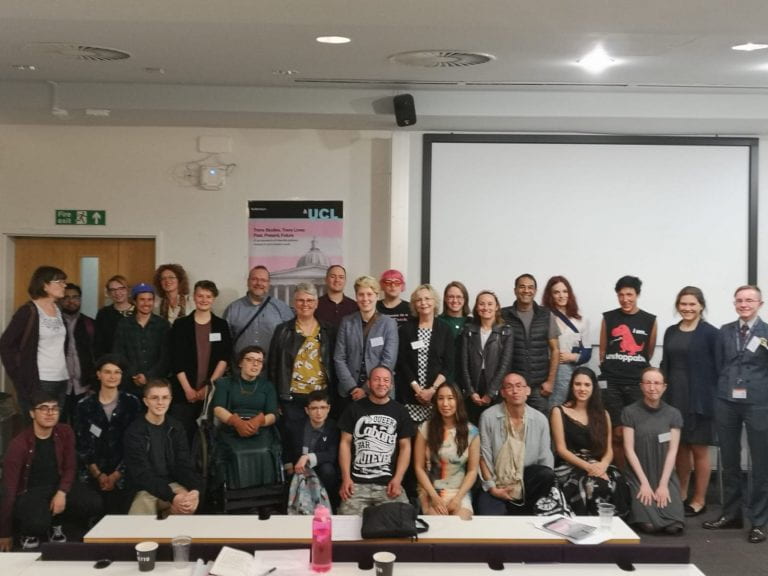Trans Studies, Trans Lives: Past, Present and Future
On the 25th May, a full-day symposium was held on the theme of Trans Studies, Trans Lives: Past, Present and Future, funded by UCL’s Grand Challenge of Justice & Equality, the Institute for Academic Studies, and the UCL Office for Equality, Diversity and Inclusion.
The symposium brought together a diverse group of academic and non-academic delegates to tackle intellectual misunderstandings about trans people and to provide an informed perspective about the identities, lives, and rights of trans people in the UK through a combination of multi-disciplinary research and personal storytelling.
Topics
Papers were presented on a broad range of topics including medieval art and literature, sci-fi and fantasy, law, and lived experience, providing a centrepiece for further discussion on the theme of trans studies and lives; the creative work presented included audio art pieces and a short film. A follow up discussion panel on Lived Gender Diversities with UCL Geography was held during UCL’s Festival of Culture.
The organisers introduced the event with a statement of their intent to celebrate a diversity of people and opinions, and to welcome discussion. The event was opened by Professor Sasha Roseneil, Executive Dean of the Faculty of Social and Historical Sciences.
Panel 1: Trans histories
The Digital Transgender Archive
The first panel focused on historical representations and perspectives of individuals who might contemporarily be recognised as trans (or trans*). The panel dug deeply into issues related to naming and classification, authorship and zeitgeist, through examples of work ranging from 15th century art and literature to Victorian scandal.
Keynote talk: Trans rights
The first keynote addressed the 2004 Gender Recognition Act and the legal evolution of trans rights in the UK over the past 50 years. The speaker discussed how many of these rights including workplace protections and legal recognitions of trans identities, which have been hard- and controversially won, are entirely things cis people take for granted. It was stressed that trans people want basic equal rights, a desire that is frequently misrepresented, and their needs should be centered.
Panel 2: Past to present
This panel focused on how society’s understanding of gender has shaped the ways that we recognise the identities of trans individuals, such as Lili Elbe, and for recognising solidarity between cis lesbians and trans women. A third planned talk could not be delivered, which would have explored the ways in which trans-masculine black folk must navigate historical racist perceptions about black masculinity. Archive available here.
Panel 3: Confronting categories
Featuring talks from binary and non-binary trans perspectives, the audience were offered a candid account of daily life such as how gender can feel like a prison. Another talk focussed on “Mx” as an option in systems, and the ways in which Mx has been used by corporations as a smokescreen for providing options that are genuinely inclusive to non-binary individuals. Our final speaker tackled the case of the Kenwood Ladies Pond, and issues of exclusion.
Paragraph 4: Representations
The final panel explored how transgender individuals seek to represent their own experiences in media such as science fiction. Creative presentations included a screening of the short film “Step Out” and an audio presentation.
Final keynote: Trans: Adventures Across Time and Space
In a far-ranging talk that superbly knitted together the core theories and threads of the symposium, the speaker unfolded trans lives in spatio-temporal terms with references to X-Men and other works of science fiction. They argued that misgendering denies trans people a future, but “acceptable” trans narratives also erase the past; that policies and practices relating to trans identities require clairvoyance and that simultaneously cultural amnesia annihilates trans histories.
The event was organised by Dr. Christine ‘Xine’ Yao (English), Dr. Ella Metcalfe (Maths and Physical Sciences), and Dr. Ezra Horbury (English). It was followed by a live-audience roundtable discussion on future initiatives during the UCL Festival of Culture. Roundtable participants included Dr. Christine ‘Xine’ Yao, Dr. Ezra Horbury and Lo Marshall (Geography).
Trans Studies, Trans Lives: Past, Present and Future
List of speakers:
PANEL 1: TRANS HISTORIES
Prof. Robert Mills (University College London): Recognising Wilgefortis
Dr. Katherine Inglis (University of Edinburgh): Trans Visibility in Late-Victorian English Publishing
Prof. Ann Heilmann (University of Cardiff): James Miranda Barry and the Conundrum of Historical Transgender Representation
FIRST KEYNOTE
Prof. Stephen Whittle (Manchester Metropolitan University)A Perfect Storm: The UK Government’s Failed Consultation on the Gender Recognition Act 2004
PANEL 2: PAST TO PRESENT
Prof. Pamela L. Caughie (Loyola University Chicago): Queer Modernism and Trans Lives: Lili Elbe’s Life Narrative
Prof. Susan Rudy (Queen Mary University of London): On Gender Ontoformativity, or Refusing to Be Spat Out of Reality: Reclaiming (Trans and Cis) Lesbian Solidarity through Experimental Writing
Meshach Yaa-Yaw Owusu (University of Leeds): Black Trans Masculinities: Redefinition as Survival
PANEL 3: CONFRONTING CATEGORIES
LJ Thuringer (Independent): Who Needs Gender
Aiden Greenall (Independent): “Please select one: Mr./Mrs.”: “Mx.” and Non-Binary Resistance
Lo Marshall (University College London): Negotiating Gender Diverse Worlds Built on Binary Expectations: The Kenwood Ladies Pond
PANEL 4: REPRESENTATIONS
Victoria Sin (Independent): Embodied Narratives
Lara Bochmann and Erin Hampson (Independent): StepOut (short film)
Felix Kawitzky (University of York): The Changeling’s Story: The Fantastic Duplicity of Queer Bodies in Sci-Fi and Fantasy Fiction
SECOND KEYNOTE
Dr. Meg John Barker (Open University)Trans: Adventurers across Time and Space



Comments are closed, but trackbacks and pingbacks are open.